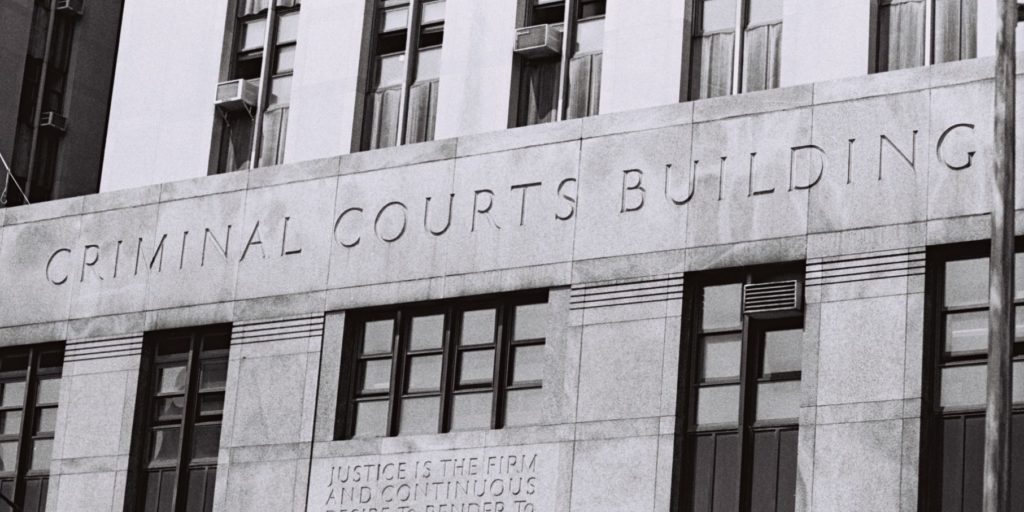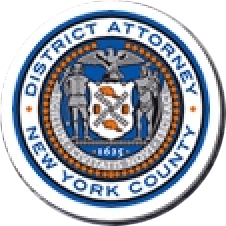Early District Attorneys
Until 1801, Manhattan did not have a District Attorney; instead, criminal cases were prosecuted personally by the New York State Attorney General. Manhattan’s first District Attorneys were appointed by the Council of Appointment, a body created by the New York Constitution of 1777 for the purpose of appointing government officials for which the Constitution provided no other means of appointment or election. Under the Constitution of 1821, District Attorneys were appointed by the now-abolished Court of General Sessions, a process that continued until the Constitution of 1846, which provided for the popular election of District Attorneys. The first elected Manhattan District Attorney was John McKeon, who was elected in 1847 after having been appointed the previous year.
Thomas E. Dewey
The modern era of professional, non-partisan prosecution began in 1935 when Thomas E. Dewey was named a special prosecutor to combat organized crime in Manhattan. With his own staff, offices and budget, Mr. Dewey operated independently of the sitting District Attorney. Among Mr. Dewey’s innovations upon taking office as District Attorney were the creation of the Rackets Bureau and the Frauds Bureau, the establishment of a team of forensic accountants to investigate financial crimes, and the creation of an in-house Investigation Bureau.
For much of its earlier history, the District Attorney’s Office had been beset by political cronyism and a somewhat laissez-faire attitude toward crime. The Office changed course radically with Mr. Dewey’s election as Manhattan District Attorney in 1938. Having galvanized the legal community with his far-reaching assault on racketeering and organized crime while New York’s Special Prosecutor, the “racket-buster” brought the same measure of boundless energy, political non-partisanship, imagination and zeal to his four-year tenure as District Attorney.
-
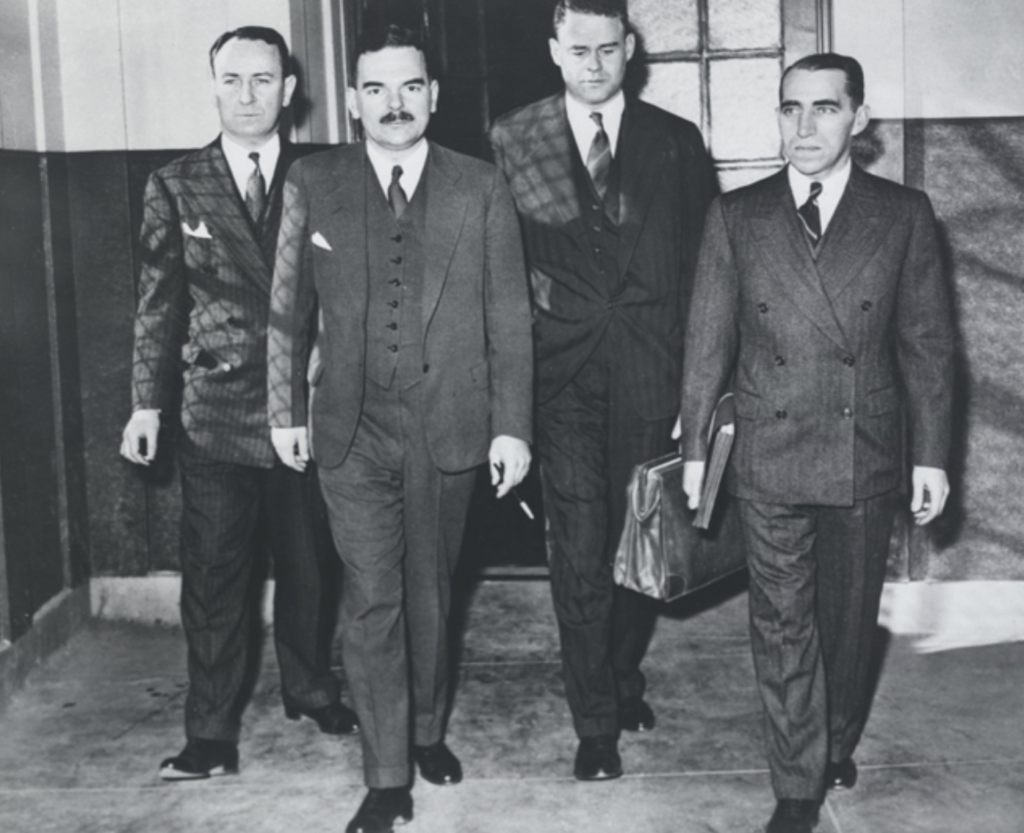
-
Mr. Hogan & Mr. Dewey, date unknown
-
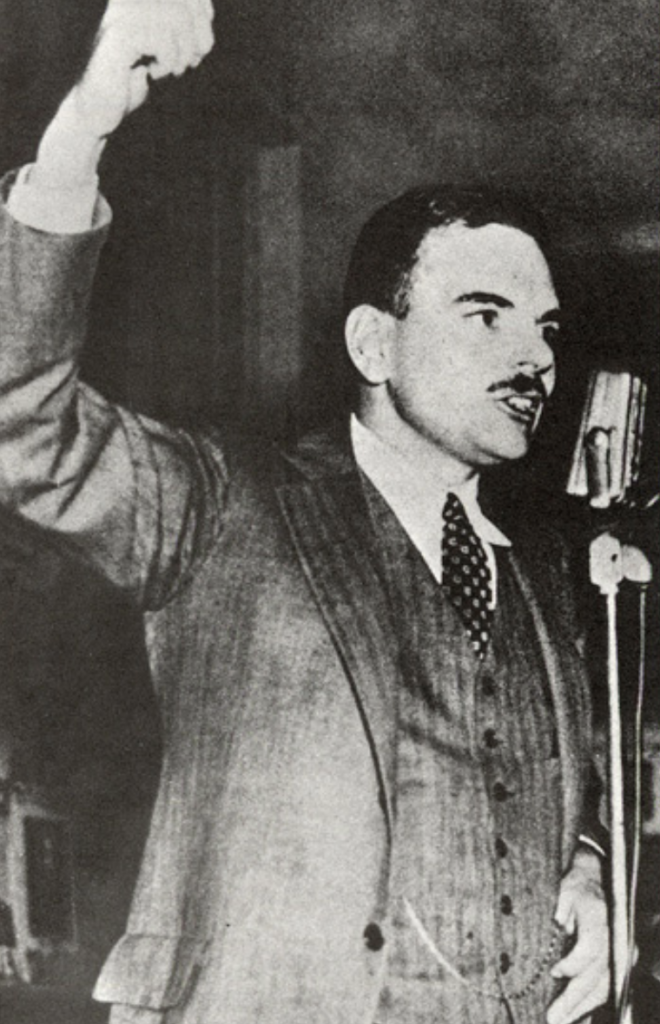
-
Mr. Dewey campaigning for District Attorney, ca. 1937
-
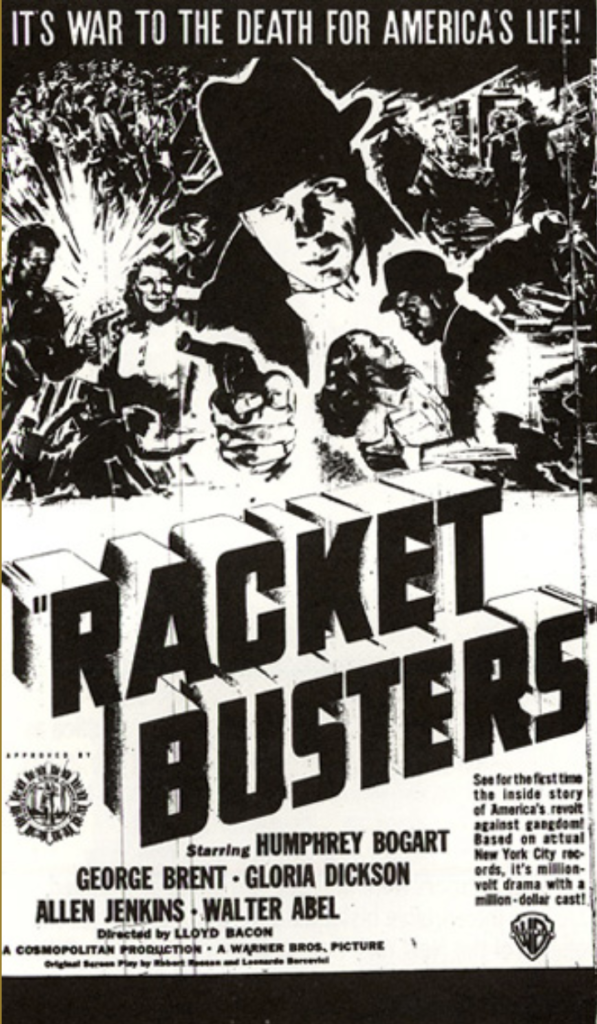
-
Racket Busters film poster, 1938
“When Dewey took over, the atmosphere became rather like that in Washington during the early days of the New Deal,” one reporter observed, referring to the excitement, energy and glamour that characterized both enterprises. Traditionally the preserve of clubhouse politicians and their pool of patrons, “the office” under Mr. Dewey’s direction assembled a staff of lawyers and investigators that in the following decades read like a Who’s Who of the legal profession.
What’s more, his many innovations redefined the work of the District Attorney’s Office. From a relatively passive, reactive force, it was transformed into a “veritable factory of prosecution.”
1936

Salvatore “Lucky Luciano” Lucania mug shot, 1936
Mr. Dewey took the lead in investigating extortion rings, prostitution, gambling, and corruption in organized labor and government. Under Mr. Dewey, the Office convicted a host of organized crime members and associates, including the notorious Salvatore Lucania, also known as “Lucky” Luciano.
1938
During much of the 19th and early 20th centuries, Tammany Hall reigned as one of the nation’s most successful and corrupt political machines. In 1937, the Office secured the conviction of local Tammany Hall boss Jimmy Hines, one of the most powerful leaders of Tammany Hall in New York City.
Mr. Dewey also famously conducted the investigation that led to the corruption conviction and incarceration of Martin T. Manton, who was at the time the Chief Judge of the United States Court of Appeals for the Second Circuit.

Top Row- L- Publication name unknown, 1939R- The New York Times, 1939 (1)
Frank S. Hogan
In 1942, after Mr. Dewey had been elected Governor, Administrative Assistant District Attorney Frank S. Hogan succeeded him as District Attorney. Mr. Hogan was re-elected nine times and served as District Attorney for 32 years, until he resigned from office in 1974, a short time before his death.
In the course of his 32 years in office, he steadily fashioned the Manhattan District Attorney’s Office into a paradigm of the modern prosecutor’s office. Known simply as “Hogan’s office,” and, on occasion, “Hogan’s Ministry of Justice,” the Manhattan District Attorney’s Office established a widely copied canon of legal and personal conduct for its prosecutors.
-
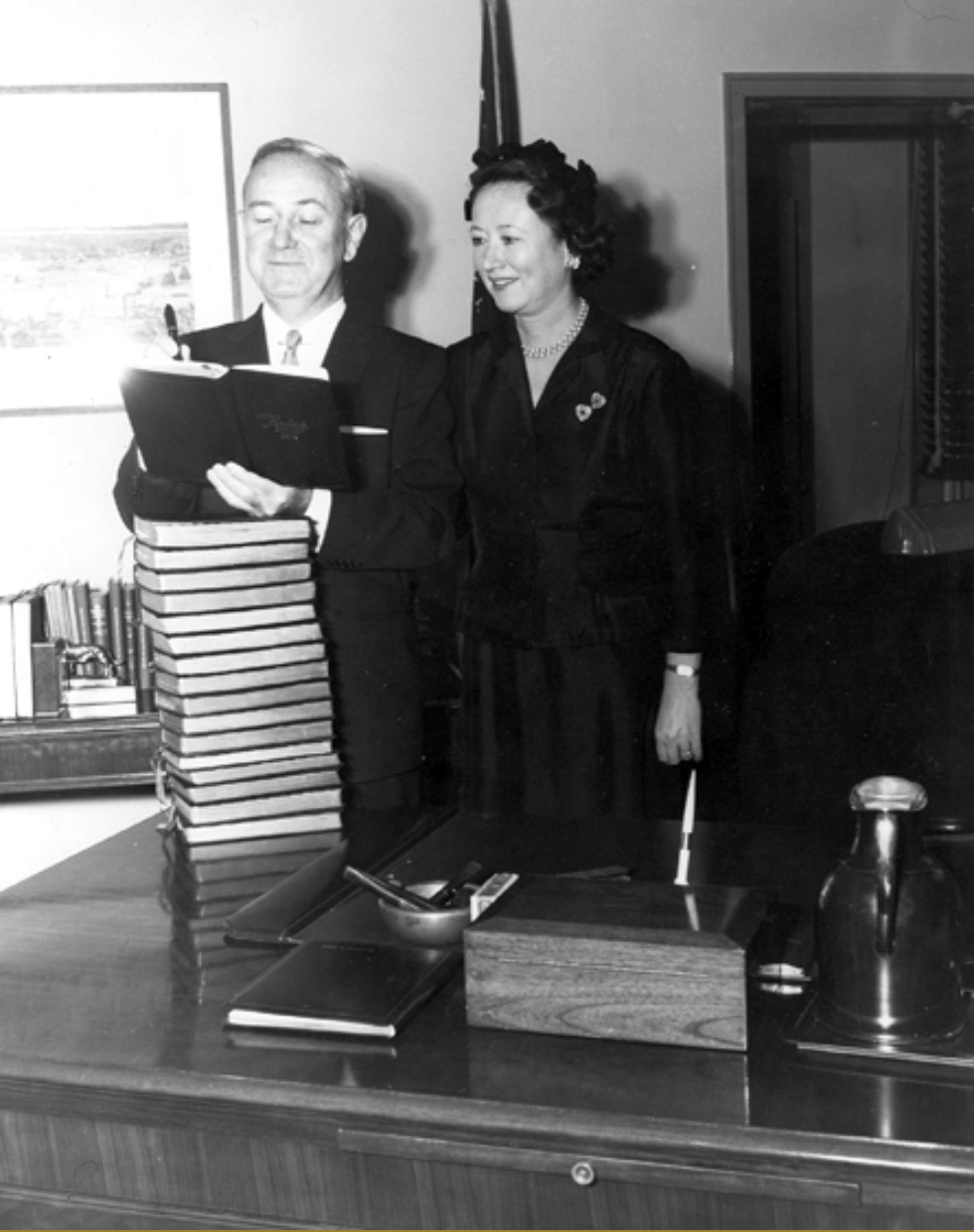
-
Frank Hogan swearing in, 1949
-
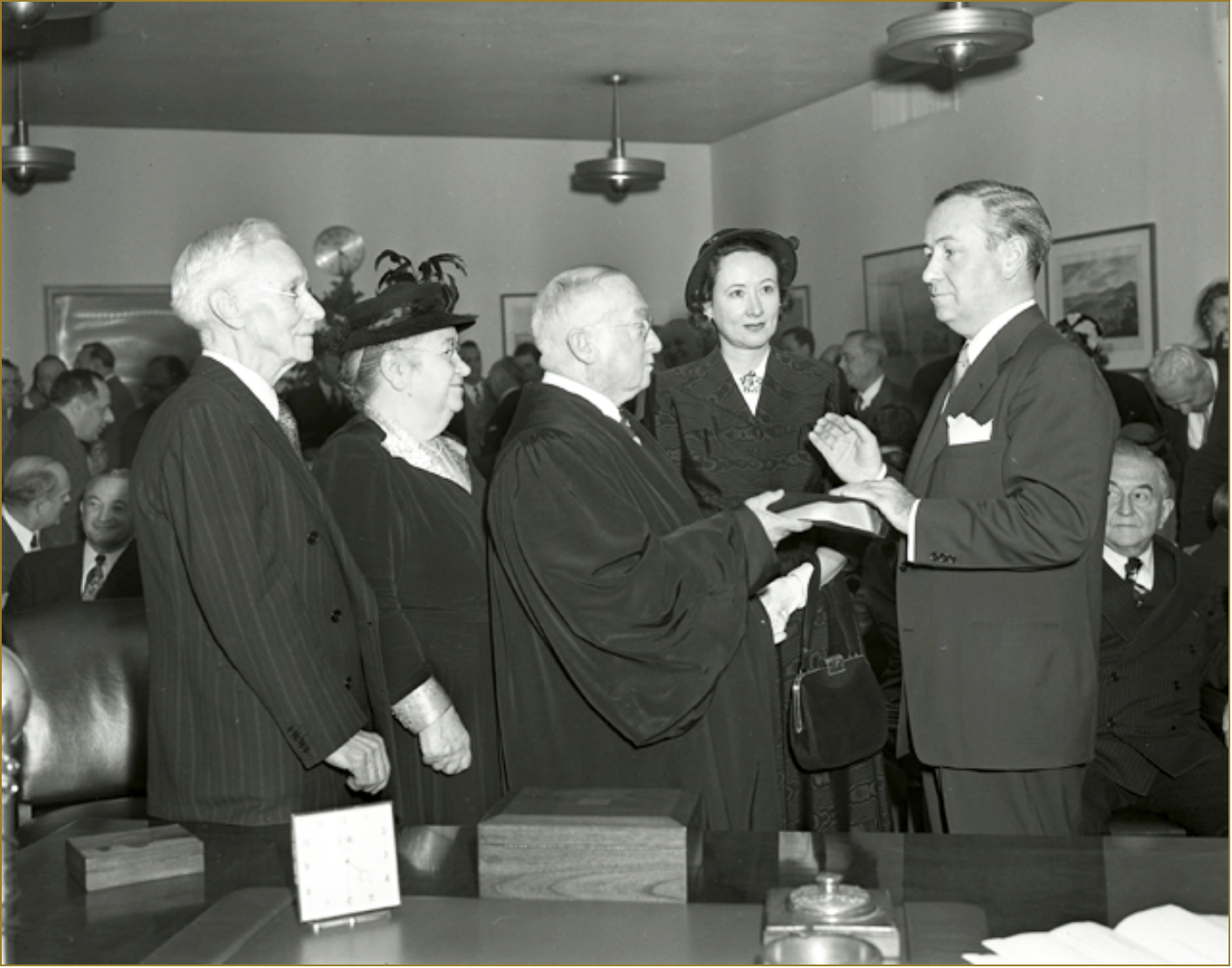
-
Frank Hogan swearing in, date unknown
-
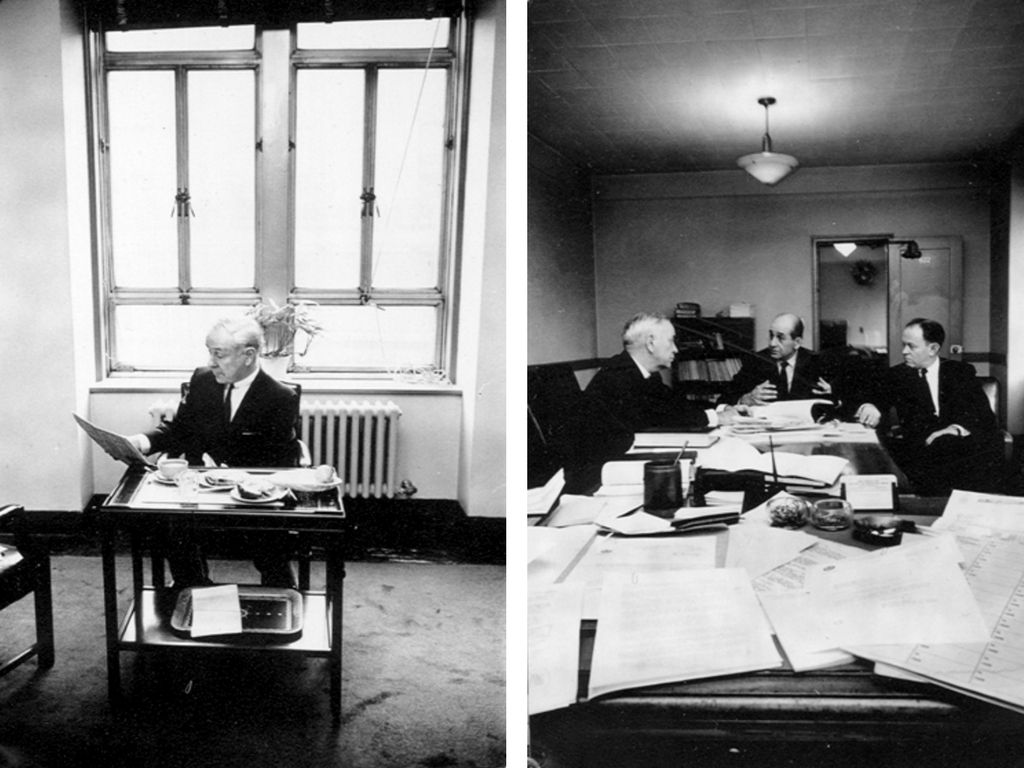
-
Mr. Hogan in Life Magazine, 1963
-
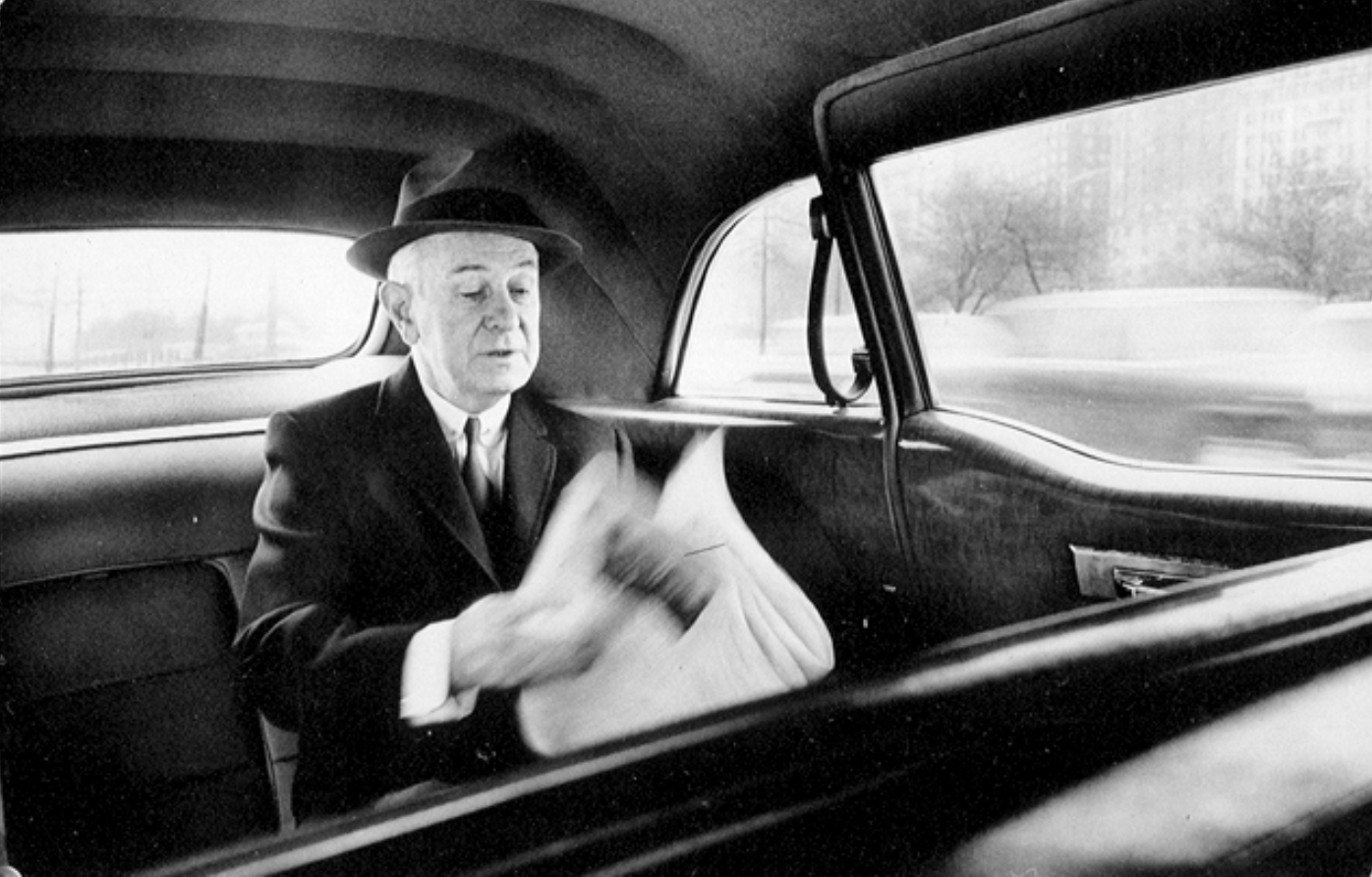
-
Mr. Hogan in Life Magazine, 1963
In high-profile cases of all kinds, including organized crime, major fraud, corruption, and homicide, as well as the no less serious robberies and other street crimes, the Office developed a national reputation for excellence, non-partisanship and fairness. The Office was as concerned with exonerating the innocent as with convicting the guilty.
In one of its most celebrated cases, the Office, after an extensive investigation, exonerated George Whitmore, Jr., who had confessed to the brutal 1963 killing of two young women in their Manhattan apartment. The real killer was later identified, prosecuted and convicted.
1958

Dotto host, Associated Press, 1958. The investigation of Dotto catalyzed the quiz show scandals of the late 1950s.
Under Mr. Hogan, the District Attorney’s Office continued to conduct major investigations into fraud, corruption and racketeering, including, for example, highly-publicized probes in the 1950s and early 1960s into the fixing of college basketball games and the television quiz show scandals.
In 1958, District Attorney Hogan began an investigation into cheating on the television quiz show Dotto following a standby contestant’s discovery of a notebook used to prep winners with the answers. It quickly became apparent to DA Hogan that a widespread conspiracy was in place to hide the truth from the public.
Many producers and contestants lied to the Manhattan DA’s Grand Jury and a subcommittee of the U.S. House of Representatives about their role in quiz show trickery, but eventually admitted to coaching contestants to agonize and sweat over answers they already knew.
Shortly after the quiz show scandals came into public view thanks to Mr. Hogan’s investigation, the U.S. Congress made it a federal crime to give or receive assistance on a quiz show.
1967
“In theory, the function of the District Attorney is to prosecute in the courts people charges with committing felonies and misdemeanors. In fact, so far as serious crimes are concerned, Hogan’s office determines whether accused people are guilty or not. Once the New York D.A. decides you are guilty of a felony, you are. As of June 23, the office has prosecuted to a conclusion this year 2,182 people accused of a felony. Seven of them—0.33%—had been acquitted. Seventy-two had been convicted by juries, and 2,103 have entered a plea of guilty to something.
Defendants plead guilty in New York County because their lawyers can demonstrate to them that they have no earthly hope of winning in court. Thought Hogan has no firm policy on disclosing the prosecution’s case, and an Assistant District Attorney who feels the defense lawyer is a crook is empowered to give him no more than the law demands, standard operating procedure is to lay out the people’s evidence in a conference with the defendant’s lawyer and then begin to negotiate about the severity of the charge to which the defendant should plead.
‘Our record of convictions,’ Hogan says, ‘does not show greater proficiency in the courtroom, but a better screening process. I ask a question whenever there’s an acquittal, because it means the jury thinks we brought an innocent man to trial, and I think a jury is usually right.'”
– “Hogan’s Office is a Kind of Ministry of Justice”, NYT Magazine, July 23, 1967

“Hogan’s Office” is a Kind of Ministry of Justice, NYT Magazine, July 23, 1967
1974

Mr. Hogan campaigns with Mr. Morgenthau, 1973
Richard Kuh succeeded DA Hogan as Manhattan District Attorney after Mr. Hogan suffered a stroke and resigned. The street address of the Manhattan District Attorney’s main office was renamed One Hogan Place in his honor. Mr. Kuh was defeated by Robert M. Morgenthau in the September 1974 Democratic primary for the special election to fill the vacancy.
Robert M. Morgenthau
In 1975, Robert M. Morgenthau, who had previously served for nine years as the United States Attorney for the Southern District of New York, became the Manhattan District Attorney. Faced with rising levels of violent street crime and property offenses when he took office, District Attorney Morgenthau restructured the Office, implementing early screening of felony cases by experienced assistant district attorneys and “vertical” prosecution, which guaranteed that felonies and other serious cases would be handled by the same prosecutor from start to finish. Over the years, he created many specialized units, including the nation’s first Sex Crimes Unit. These organizational changes boosted Manhattan’s conviction rate and led to a dramatic decline in violent crime.
-
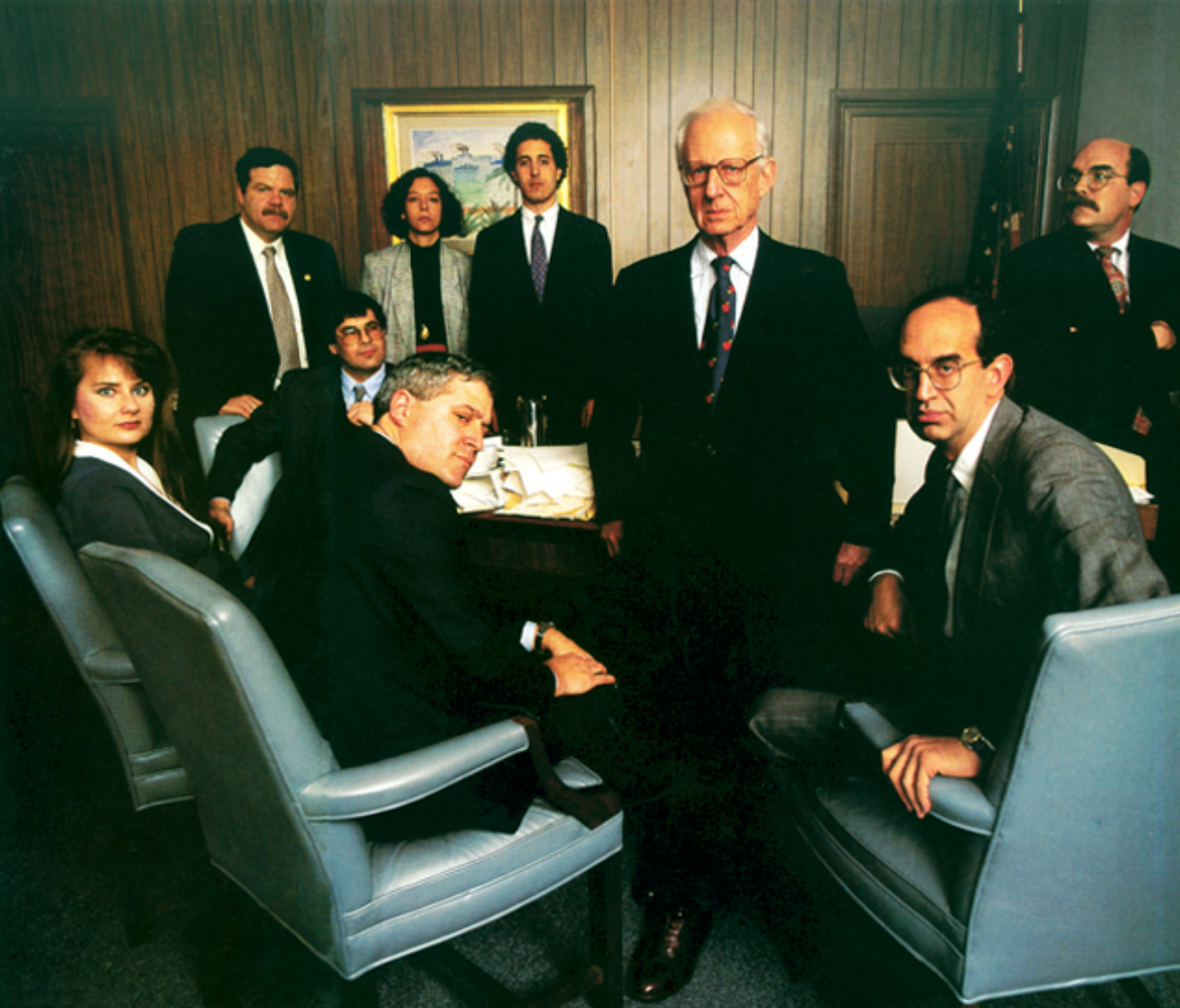
-
Mr. Morgenthau with staff, 1988 Photo Credit: New York Magazine
-
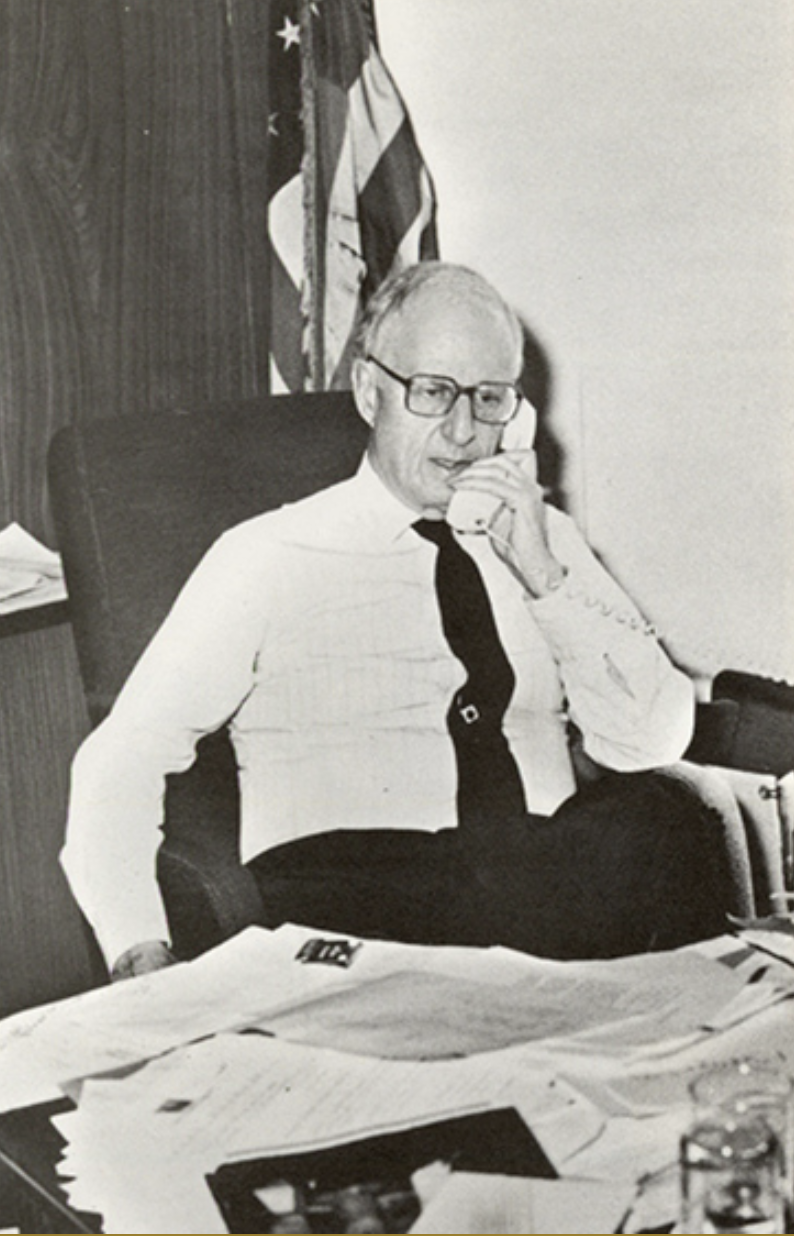
-
Mr. Morgenthau at work, 1988. Photo Credit: Julianne Schaer
-

-
West Side Highway, 1975. Photo Credit: Andy Blair
With more violent felons and repeat offenders being sentenced to state prison, crime in New York County dropped markedly. For example, in 2008 there were 62 homicides, 89 percent fewer than in 1974, the year Mr. Morgenthau was elected. During Mr. Morgenthau’s tenure, there was an equally dramatic drop in other crimes throughout Manhattan, including robbery, burglary, and forcible rape.
-
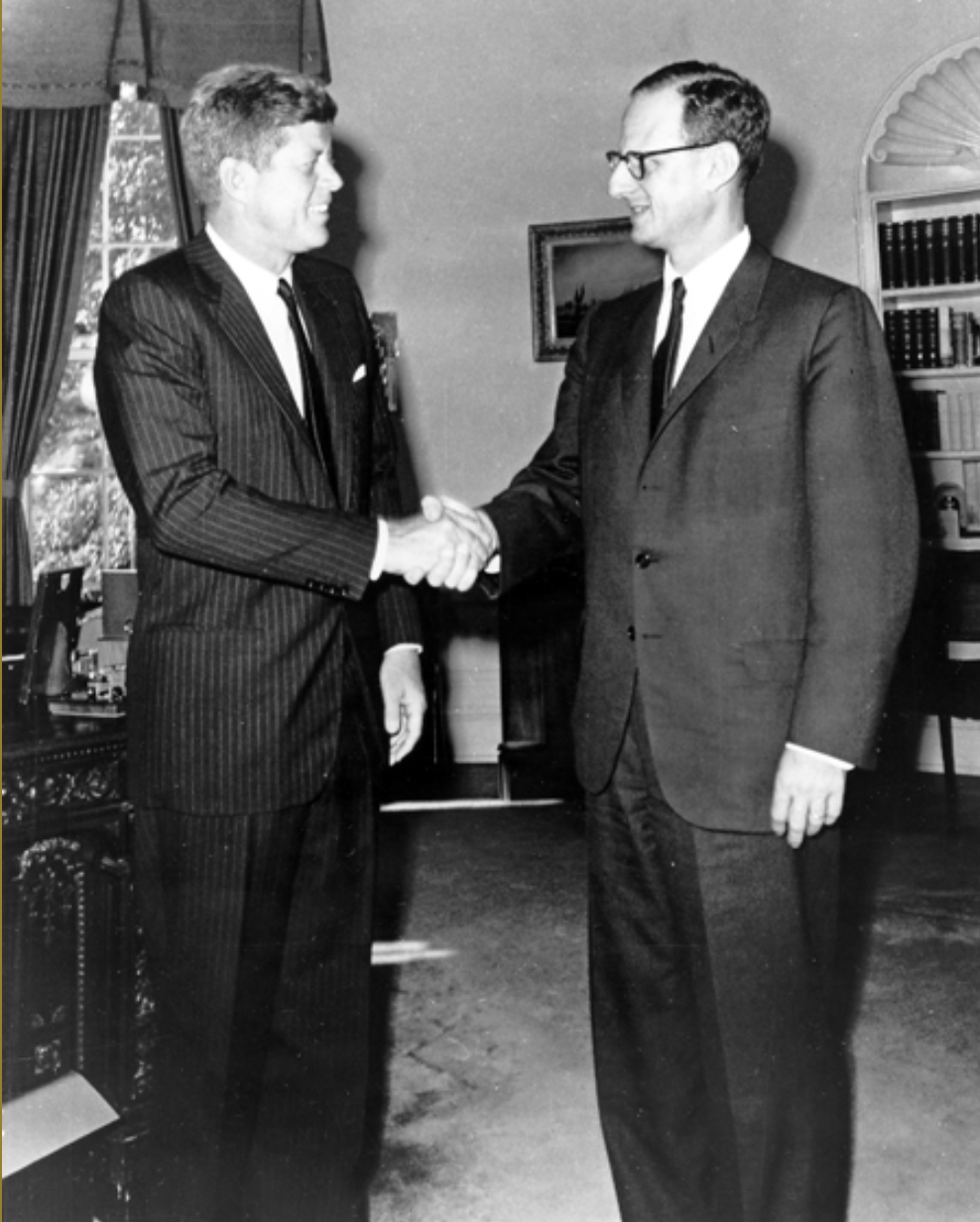
-
Mr. Morgenthau shakes hands with President John F. Kennedy, 1962
-
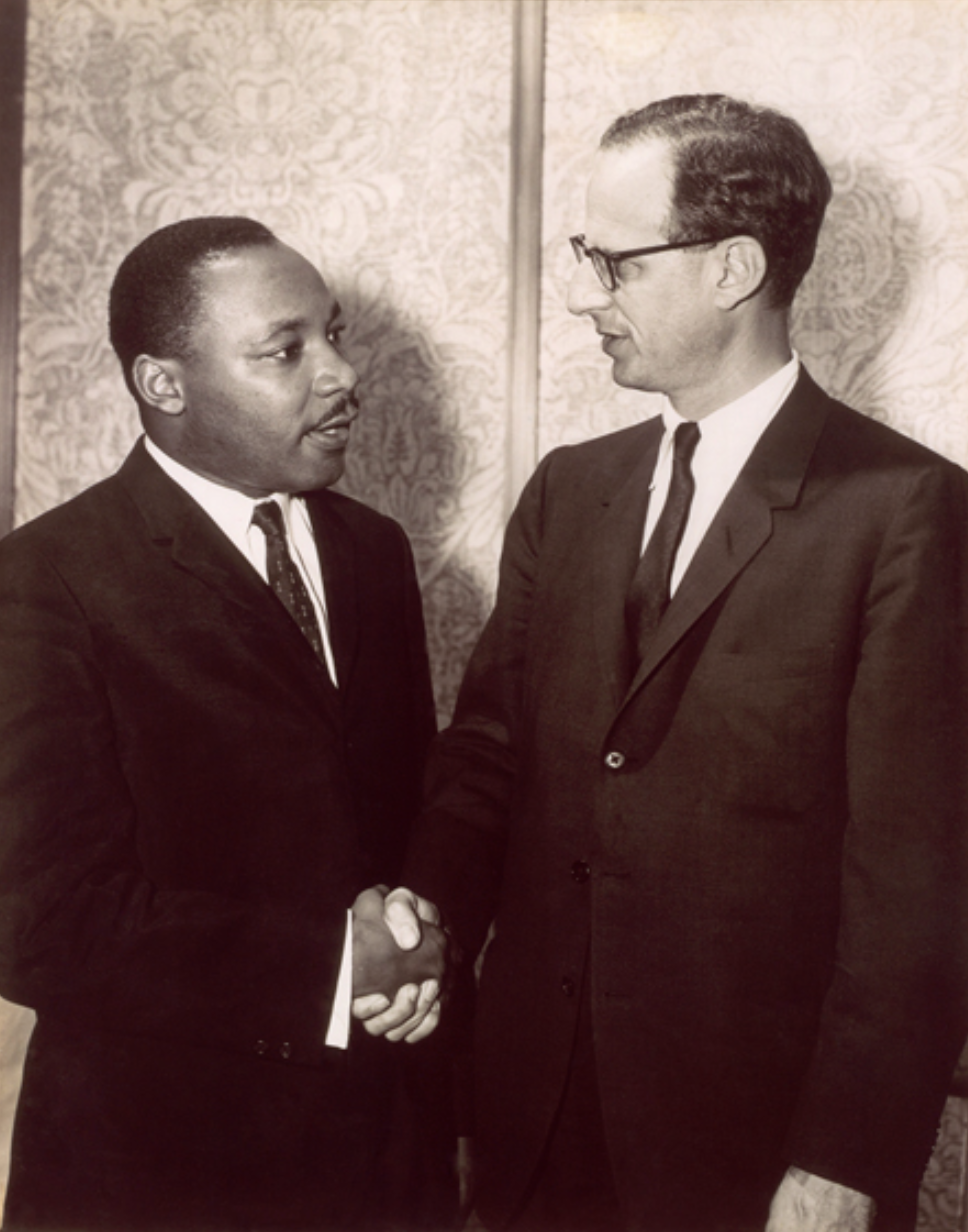
-
Mr. Morgenthau shakes hands with Martin Luther King, Jr., 1962
-

-
Mr. Morgenthau shakes hands with President Lyndon B. Johnson, 1967
-
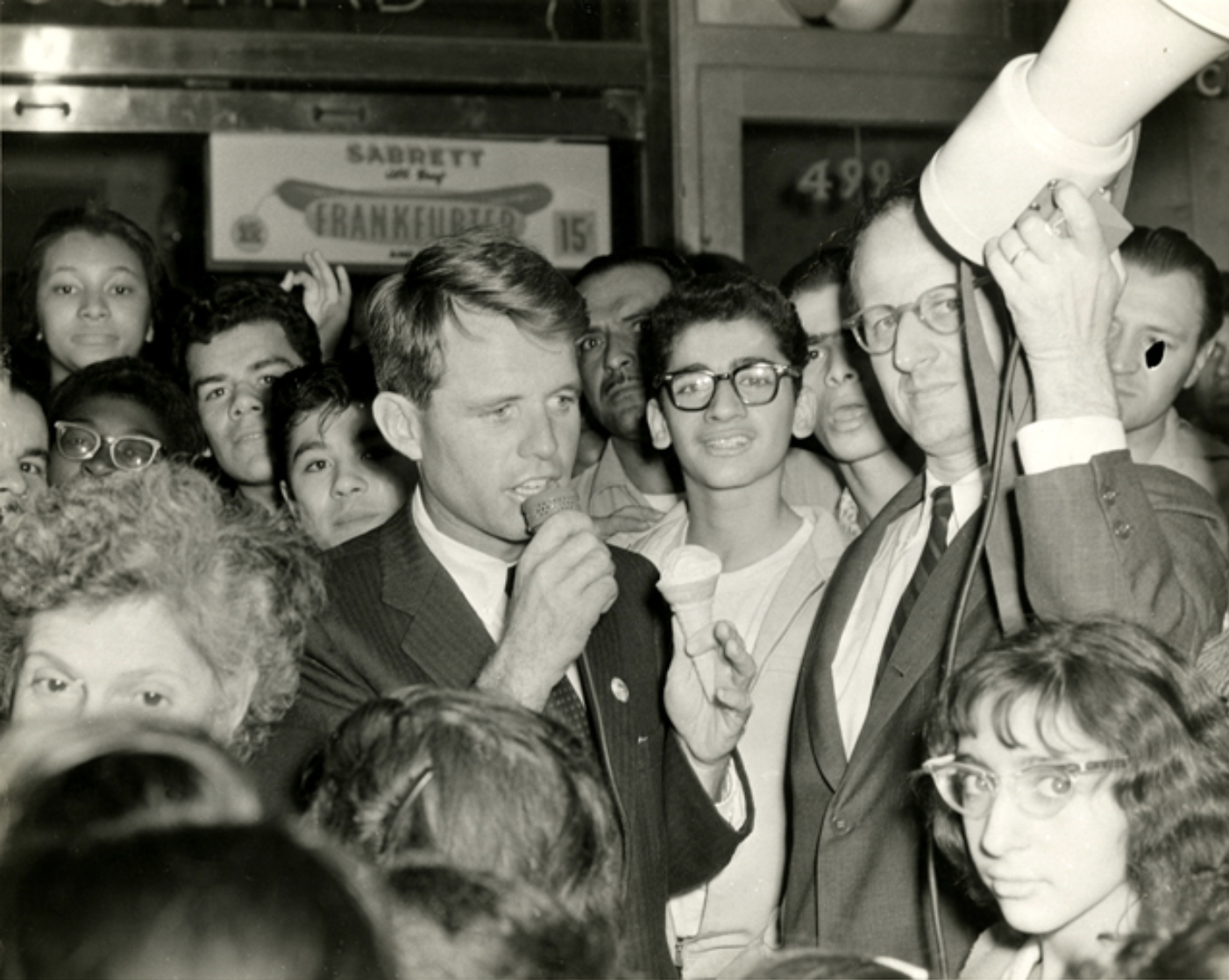
-
Mr. Morgenthau campaigning with Robert F. Kennedy, 1960
-
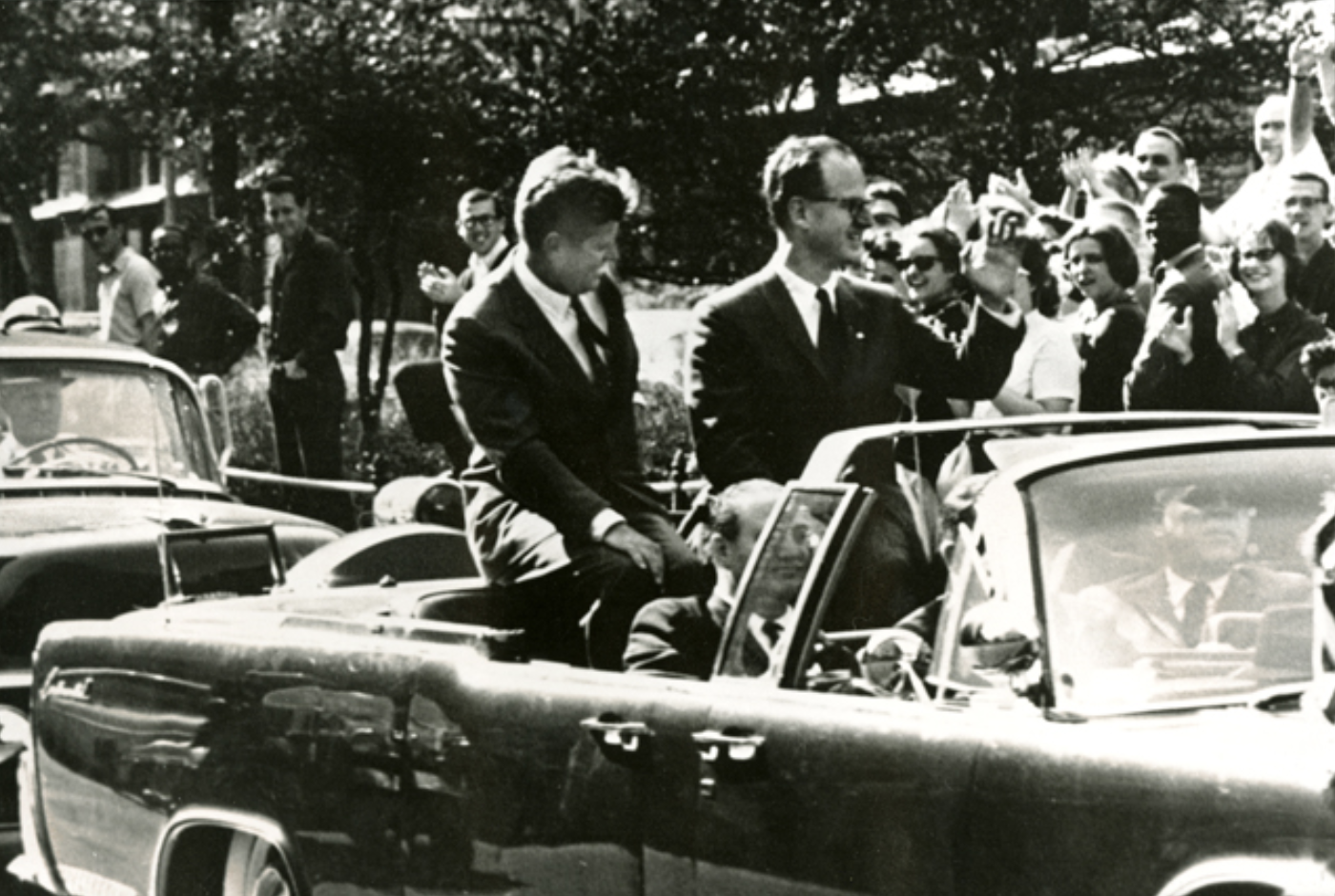
-
Mr. Morgenthau campaigning with John F. Kennedy, 1960
Under Mr. Morgenthau, the Office tirelessly pursued public corruption, complex fraud, and organized crime cases. The Investigation Division was created to coordinate the Office’s white-collar crime, corruption, and organized crime efforts, creating specialized units as needed, such as the Money Laundering and Tax Crimes Unit, to focus on areas of particular concern. The Investigation Division prosecuted systemic corruption and fraud in the construction trades, the garment industry, foreign and domestic banking, the securities business, municipal unions, and city and state government.
In a prosecution of major figures in the private trade-waste business in the mid-to-late 1990s, the Office used the state’s Organized Crime Control Act to help rid an important sector of the city’s economy of mob domination and anti-competitive practices, leading to administrative reform in the licensing and regulation of waste carters.

Matter of Morgenthau v. Cook was the only case DA Morgenthau argued personally before the New York Court of Appeals. Mr. Morgenthau challenged the system of assignment of judges in the City of New York, by filing a proceeding against the Chief Judge of the State of New York (Cook). Cook recused from the case, leaving only six Judges, and Morgenthau won 6-0.
Under Mr. Morgenthau, the Office’s Trial Division prosecuted some of the most notorious homicides in recent memory, including: the murder of John Lennon; the CBS murders; the murder of 6-year-old Lisa Steinberg by her adopted father, Joel Steinberg; the murder of Police Officer Anthony Sanchez; the “preppy murder” of Jennifer Levin by Robert Chambers; the murder of Irene Silverman by grifters Sante and Kenneth Kimes; and the murder of “realtor to the stars” Linda Stein by Natavia Lowery.
Civic Involvement
One of D.A. Morgenthau’s principal civic activities is the Police Athletic League of New York City (PAL), which he has served since 1962, first as President and then as Chairman of the Board of Directors.
-
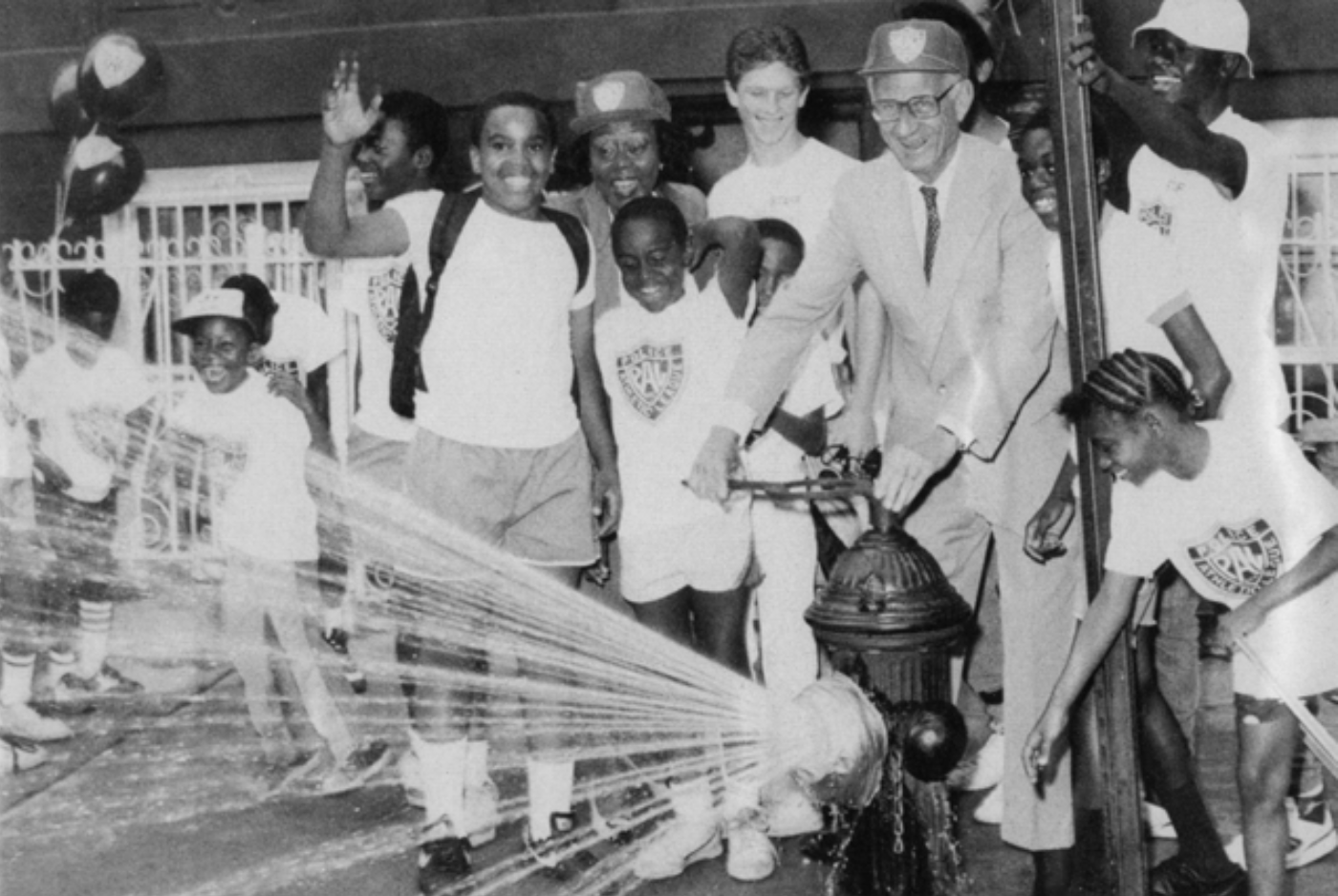
-
Robert Morgenthau at PAL Play Streets opening, date unknown
-
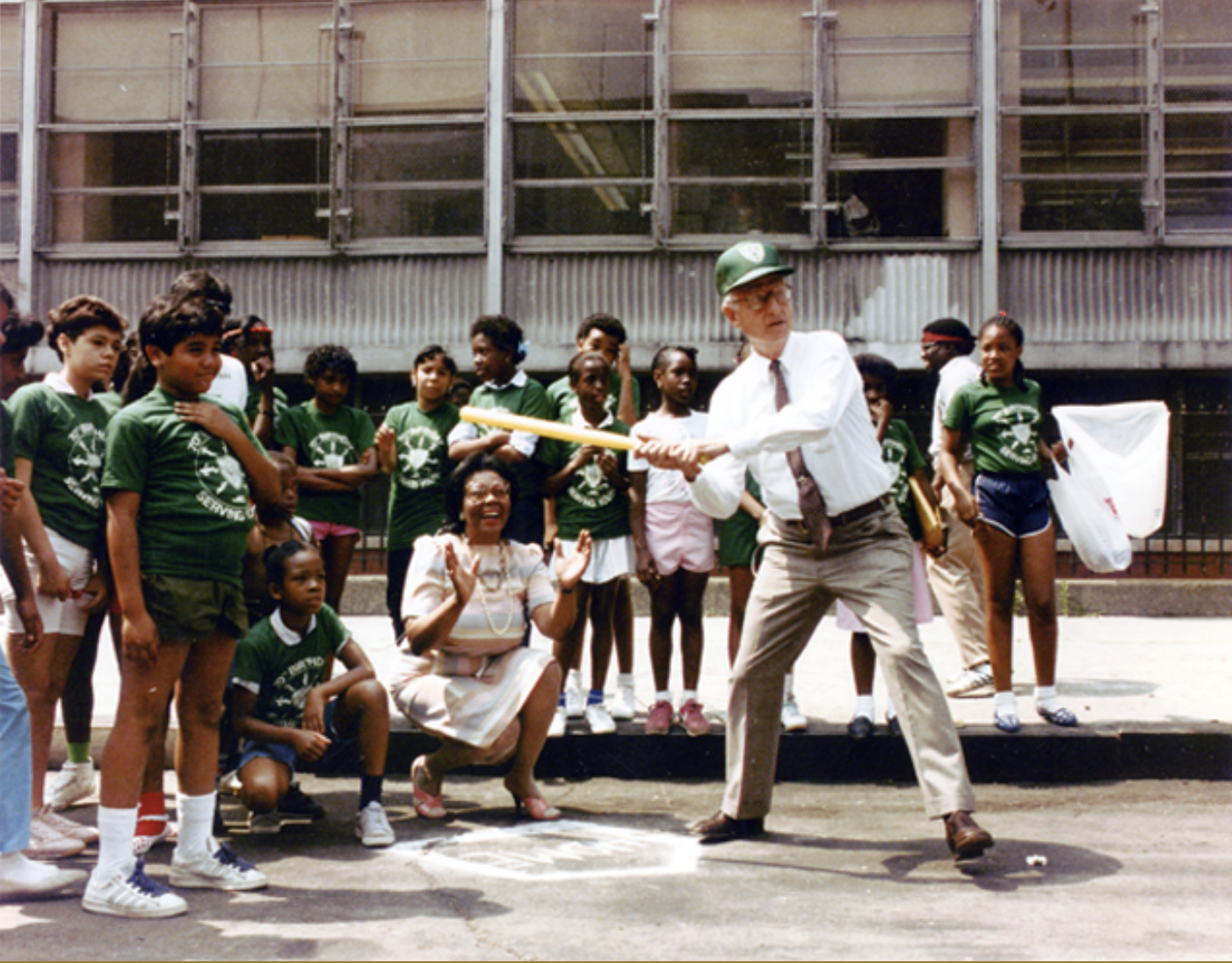
-
Robert Morgenthau playing stickball at PAL Play Streets opening, date unknown
Cyrus R. Vance, Jr.,
Cyrus R. Vance, Jr., was first sworn in as the District Attorney of New York County in January 2010 and, over the course of three terms, enhanced the District Attorney’s Office as a national leader in criminal justice by expanding its expertise on an array of 21st century crimes and expanding the impact of the Office beyond its traditional courtroom role to include investing in underserved communities to prevent crime and justice-system involvement, reforming the criminal justice system to end mass incarceration, and reinventing the Office to take on 21st century threats, such as cybercrime, terrorism, and trafficking.
Mr. Vance led many high-profile and consequential courtroom victories, including Trump v. Vance and People v. Weinstein, along with aggressive, successful investigations against eleven of the world’s biggest banks. D.A. Vance then directed hundreds of millions of dollars in forfeited proceeds of the economic crimes committed by those banks to 50 community-based organizations that are supporting young people, crime survivors, and reentering New Yorkers in underserved Manhattan communities through the Manhattan D.A.’s Criminal Justice Investment Initiative.

D.A. Vance made justice reform a central mission of the Office. In addition to right-sizing the justice system by slashing the Office’s total prosecutions by 58 percent, D.A. Vance established ground-breaking initiatives that helped end the era of mass incarceration, including New York State’s first-ever: Conviction Integrity Program, Crime Strategies Unit, College-in-Prison Program, Citywide Supervised Release Program, Implicit Bias Review, and Equity and Social Justice Advisory Board. He created the state-of-the-art Manhattan D.A. Cyber Lab, the first in a U.S. prosecutor’s office, as well as Saturday Night Lights, the signature youth violence prevention program that expanded from one location to gyms across New York City.

Under D.A. Vance’s leadership, the D.A.’s Office repositioned itself to confront contemporary threats to New Yorkers, including international cybercrime, white nationalist terrorism, human trafficking, and the national rape kit backlog. D.A. Vance co-founded Prosecutors Against Gun Violence, an independent, non-partisan coalition of prosecutors from major coalitions across the country, as well as the cross-sector, cross-border Global Cyber Alliance and New York City’s Cyber Critical Infrastructure Task Force, the nation’s only public-private partnership to address and prevent cyberattacks on critical infrastructure. In Washington, D.C., he successfully advocated on behalf of New Yorkers to stop the Concealed Carry Reciprocity Act and enact the first-ever Congressional appropriations toward ending the rape kit backlog.

Mr. Vance co-founded Prosecutors Against Gun Violence, an independent, non-partisan coalition of prosecutors from major jurisdictions across the country. He also co-founded the Global Cyber Alliance, a non-profit, cross-sector consortium to advise members from every continent on cyber risks and cyberattack prevention; as well as New York City’s Cyber Critical Infrastructure Task Force, the nation’s only public-private partnership to address and prevent cyberattacks on critical infrastructure.
Alvin L. Bragg, Jr.
Alvin L. Bragg, Jr. is the 37th District Attorney elected in Manhattan. A son of Harlem who has served as both a state and federal prosecutor, Alvin has spent more than two decades fighting to make our communities safer and our criminal justice system fairer. He is the first Black Manhattan DA in the history of the office.
Alvin restructured the Manhattan DA’s Office to focus more resources on prosecuting serious violent crimes, meeting the needs of survivors, reducing recidivism by addressing the underlying causes of criminal behavior, protecting everyday New Yorkers from abuses by the powerful, and correcting past injustices by vacating wrongful convictions. Alvin also directly oversees a unit to root out police misconduct.
Under his leadership so far, the office has increased gun prosecutions, focused on gun traffickers and ghost gun manufacturers, and charged and secured convictions for numerous armed robberies, shootings, and homicides. At the same time, the office invested in community-based gun violence prevention programs and services to address the trauma suffered by victims and witnesses to gun violence.
Alvin created a new Special Victims Division, which includes the Domestic Violence, Sex Crimes, Human Trafficking, Child Abuse, and Elder Abuse Units. The Division is staffed with specially trained prosecutors, investigators, analysts, and social workers who are dedicated to handling these extremely sensitive cases in a trauma informed and survivor centered manner.
In line with his deep commitment to centering the well-being of survivors, Alvin has elevated the work of the Witness Aid Services Unit by giving the office’s counselors and social workers additional resources to meet a wide range of needs for survivors, witnesses, and victims’ family members.
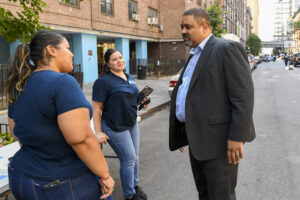
Alvin also expanded the Hate Crimes Unit with additional prosecutors, investigators, analysts, victim services staff and community partnership coordinators. The Unit is taking on a record number of complex cases and conducting intensive outreach to build community trust and encourage reporting of hate crimes.
Recognizing that criminal behavior is often driven by underlying needs that will not be met exclusively by incarceration, Alvin created the Pathways to Public Safety Division. Pathways ADAs screen and assess every case as early as possible for potential diversion into evidence-based programming, including mental health and substance use treatment, cognitive behavioral therapy, education, and job training, with the goal of reducing recidivism and making Manhattan safer. Each case is assessed individually. If diversion is appropriate, services are individually tailored to address the person’s needs and safely reintegrate them into the community.
As a long-time white-collar prosecutor, Alvin believes in holding powerful people accountable for harming everyday New Yorkers. He secured a 6-count indictment against Stephen K. Bannon and WeBuildTheWall, Inc., a Florida-based not-for-profit corporation, on charges including money laundering, conspiracy, and scheme to defraud in connection with a year-long fundraising scheme that netted more than $15 million from thousands of donors across the country based on false promises. He also secured the conviction of Trump Organization Chief Financial Officer Allen Weisselberg on 15 felony counts in connection with a long-running tax evasion scheme. He launched a dedicated Housing and Tenant Protection Unit to investigate and prosecute landlords and developers who engage in systemic fraud and tenant harassment. And he is committed to prosecute employers who steal wages and endanger workers.
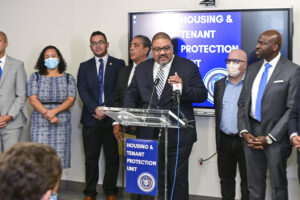
Alvin also believes that police and prosecutors must be held to the highest standards in order to strengthen community trust in our justice system. He created a revamped Post-Conviction Justice Unit to reinvestigate closed cases where there are credible claims of innocence or unjust conviction. He also created a stand-alone Police Accountability Unit to investigate, and if warranted, prosecute officers who engage in criminal conduct in their policing capacity. Both units are insulated from the rest of the office and report directly to the DA.
Prior to his election as DA, Alvin served as an Assistant Attorney General at the New York State Attorney General’s Office and as an Assistant U.S. Attorney for the Southern District of New York. In these roles, Alvin handled a wide array of criminal cases, including armed robbery, assault, gun possession, witness tampering, narcotics and gun trafficking, wage and hour violations, public corruption, money laundering, and antitrust violations.
He ended his service in the State AG’s Office as the Chief Deputy Attorney General, overseeing more than 1,500 people, a budget of $225 million, and the office’s criminal and civil investigations and litigation, including health care fraud, public corruption, narcotics trafficking, wage-and-hour investigations, tenant harassment, and securities fraud. Alvin also directly oversaw the Attorney General’s litigation against the Trump Foundation and served as the first Chief of a special unit that investigated deaths caused by police conduct.
After his government service and before being sworn in as District Attorney, Alvin was a Visiting Professor of Law and Co-Director of the Racial Justice Project at New York Law School. In that role, he represented Eric Garner’s mother and sister in a lawsuit against the City of New York seeking details concerns Mr. Garner’s death.
Alvin earned his A.B. from Harvard University, a J.D. from Harvard Law School, clerked for Hon. Robert P. Patterson, Jr. in the Southern District of New York. Alvin is a former member of the Board of Directors of the New York Urban League and the Lawyers’ Committee for Civil Rights Under Law, and a Sunday School teacher at his church.
Complete list of Manhattan District Attorneys
- Alvin L. Bragg, Jr., 2022- Present
- Cyrus R. Vance, Jr., 2010 – 2021
- Robert M. Morgenthau, 1975 – 2009
- Richard H. Kuh, 1974 – 1974
- Frank S. Hogan, 1942 – 1974
- Thomas E. Dewey, 1938 – 1941
- William C. Dodge, 1934 – 1937
- Thomas C.T. Crain, 1930 – 1933
- Joab H. Banton, 1922 – 1929
- Edward Swann, 1916 – 1921
- Charles Albert Perkins, 1915 – 1915
- Charles Seymour Whitman, 1910 – 1914
- William Travers Jerome, 1902 – 1909
- Eugene A. Philbin, 1900 – 1901
- Asa Bird Gardiner, 1898 – 1900
- William Marvin K. Olcott, 1896 – 1897
- Vernon M. Davis, 1896 – 1896
- John R. Fellows, 1894 – 1896
- De Lancey Nicoll, 1891 – 1893
- John R. Fellows, 1888 – 1890
- Randolph B. Martine, 1885 – 1887
- Peter B. Olney, 1883 – 1884
- Wheeler H. Peckham, 1883 – 1883
- John McKeon, 1882 – 1883
- Daniel G. Rollins, 1881 – 1881
- Benjamin K. Phelps, 1873 – 1880
- Samuel B. Garvin, 1869 – 1872
- Abraham Oakey Hall, 1862 – 1868
- Nelson J. Waterbury, 1859 – 1861
- Joseph Blunt , 1858 – 1859
- Peter B. Sweeney, 1858 – 1858
- Abraham Oakey Hall, 1855 – 1858
- Lorenzo B. Shepard, 1854 – 1855
- Nathaniel Bowditch Blunt, 1851 – 1854
- James R. Whiting, 1838 – 1844
- Ogden Hoffman, 1829 – 1835
- Hugh Maxwell, 1821 – 1829
- Pierre C. VanWyck, 1818 – 1821
- Hugh Maxwell, 1817 – 1818
Notable Alumni
- Supreme Court Justice Sonia M. Sotomayor
- Former Governor Andrew M. Cuomo
- D.E.A. Administrator Anne Milgram
- Former Governors Thomas E. Dewey, Charles S. Whitman, and Eliot Spitzer
- Senior Judge Pierre N. Leval of the United States Court of Appeals for the Second Circuit
- Barbara Underwood, former NYS Attorney General
- Eunice Hunton Carter, first Black woman New York prosecutor and U.S. women’s rights representative
- NYU Law School Center on Civil Justice Director Peter Zimroth, former New York City Corporation Counsel
- Roslynn R. Mauskopf, Director of the Administrative Office of the U.S. Courts
- John Keenan, United States District Judge for the Southern District of New York
- Barbara S. Jones, Former United States District Judge for the Southern District of New York
- Sterling Johnson, Dora Irizarry, and Ann Donnelly, United States District Judges for the Eastern District of New York
- Ellen N. Biben, Administrative Judge of the Supreme Court, Criminal Term, New York County and former New York State Inspector General, as well as former Inspectors General and now Judges of the Court of Claims Dineen Riviezzo and Jill Konviser
- Former Chief Judges Charles Breitel and Stanley Fuld of the New York Court of Appeals
- Former United States Attorneys for the Southern District of New York Emory Buckner and George Z. Medalie
- Former United States Attorney for the Eastern District of New York Robert Capers
- Ronald G. Goldstock, the first Director of the New York State Organized Crime Task Force
- Lanny Breuer, former Assistant Attorney General for the Criminal Division of the Department of Justice
- Herbert J. Stern, former United States Attorney and District Judge for the District of New Jersey
- Robert E. O’Neill, former United States Attorney for the Middle District of Florida
- Justin Herdman, the United States Attorney for the Northern District of Ohio
- Michael Dougherty, District Attorney of Boulder County, Colorado
- Nicholas Scoppetta, former Commissioner of the Administration for Children’s Services and former New York City Fire Commissioner
- Archibald Murray, the first Black president of the New York State Bar Association and former Commissioner of the NYS Division of Criminal Justice Services and Attorney-in-Chief and Executive Director of the Legal Aid Society
- Numerous judges, lawyers in public service and private practice, academics, and many others.
